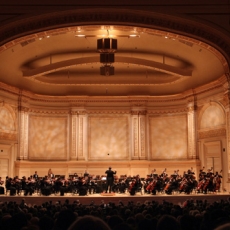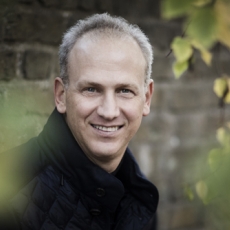The Orchestra of the Americas - Pan-American Reflections - BBC Radio 3 ‘Record Review’
Andrew McGregor: Let’s see if you’ve left the best till last. Pan-American Reflections, an album of music by Aaron Copland and Carlos Chávez, two symphonies. What’s inspired the coupling here?
Nigel Simeone: Well they were great friends for all of their lives, well nearly all of their lives, they met in the 20s or 30s and by the early 30s they were good friends, Chávez was the first person to invite Copland to Mexico with all that that produced and they were very close for the next 40 odd years. Chávez I think died in 1978.
AM: They seem to have promoted each other’s music in their separate countries, because Chávez in Mexico, Copland – actually Copland began writing his third symphony which is what we’ve got here in Mexico in 1944 didn’t he?
NS: They did. And Chávez began writing his Sinfonía india in New York so, yes.
AM: Total crossover.
NS: There’s a lovely crossover. It’s a brilliant combination of pieces actually, I think it’s a really lovely bit of programming. And it’s helped by a quite remarkable orchestra, The Orchestra of the Americas, which is a grouping of players who are all under 30 and that brings a very special quality I think to the playing.
AM: And they’re conducted by Carlos Miguel Prieto – Pan-American ensemble, a young one – does it have an identifiable character would you say?
NS: Well do you know, I think it does. The thing that impressed me most of all – and we’ll hear this certainly in the extract we’re about to listen to from the Copland – it’s not just playing of wonderful spontaneity but also incredible neatness and precision. And I think that is comparatively unusual in this piece, it’s often given a big, old, woolly sort of performance. I love the fact that this is not only full of vitality but also full of extremely crisp playing.
[Aaron Copland: Symphony No. 3: II. Allegro molto extract]
AM: Part of the second movement of Aaron Copland’s Symphony No. 3 finished in 1946 and in his notes for the first performance Copland mentions his admiration for Mahler and name checks Shostakovich and especially he says, Prokofiev in that second movement. Does it feel like it?
NS: I think so. But at the same time it feels like the unmistakeably wide open spaces.
AM: It is, it’s Copland’s signature sound isn’t it? A new recording from The Orchestra of the Americas conducted by Carlos Miguel Prieto. I see what you mean about the precision.
NS: It’s lovely.
AM: It’s really, really good and the recording…
NS: Simply spectacular. Effortlessly spectacular. It does everything you could possibly want it to do. Very wide dynamic range, which I think in this piece is incredibly exciting, because you want to hear the thing being thunderous. And some really beautiful woodwind solos as well I think are worth mentioning. There’s a sort of freshness of discovery about the whole thing too which I guess you’re going to get with younger players.
AM: And Copland 3 could do with that couldn’t it?
NS: Absolutely.
AM: The coupling is even less familiar to most of us I suspect. The Sinfonía india by Carlos Chávez, his Symphony No. 2. You’d better give us some introductions.
NS: This piece was written in 1935-6, at the same time as El Salón México in fact, and it is actually based on three tunes from Native American / Mexican folksongs, one for each movement. It’s one of those pieces that was incredibly popular when it was new-ish so there were a lot of recordings at the beginning of the LP era - Chávez himself made one, Bernstein recorded it and so on – it has rather fallen from grace since then and I don’t think it should do. It’s a one-movement symphony, so it is in three sections but one movement takes about 12 minutes and I think what certainly this performance does is remind us of what an absolute delight it is. AM: The ‘india’ of the title refers to the Mexican Indians.
NS: Exactly.
AM: But indigenous percussion is a pretty important part of the sound isn’t it?
NS: Oh yes and we’ll hear some of that. It’s one of those marvellous scores where you almost need a glossary to work out what’s supposed to be playing some of these things, but yes it is full of Mexican percussion of what sort or another.
[Plays Carlos Chávez: Symphony No. 2 "Sinfonía india" extract]
AM: Wonderful clarity and energy.
NS: Absolutely, all of that and I think we can really tell they are young players and that is an incredibly alive performance. I mean you want to jump up and applaud and very probably the people in Poland who heard it live did exactly that. It has all of the verve of a live performance but none of the potential annoyances of coughs, splutters and hysterics.
AM: It’s turned out very well hasn’t it?
NS: I think it’s lovely.
AM: A big thumbs up for this one.


